Audit Response Letter
[Your Name]
[Your Address]
[City, State, Zip Code]
[Email Address]
[Phone Number]
[Today's Date]
[Recipient's Name]
[Audit Firm Name]
[Audit Firm Address]
[City, State, Zip Code]
Subject: Response to Audit Findings
Dear [Recipient's Name],
I hope this letter finds you well. I am writing in response to the audit conducted by your esteemed firm at [Your Company/Organization Name]. We appreciate the thoroughness and professionalism with which the audit was conducted, and we acknowledge receipt of the audit report dated [Audit Report Date].
Having carefully reviewed the audit findings, we would like to address each of the identified issues as follows:
1. [Audit Finding 1]
Explanation/Clarification: [Provide a detailed explanation or clarification regarding the specific audit finding, including any relevant facts, policies, or procedures in place.]
Proposed Resolution/Action Plan: [Outline the steps or corrective actions that will be taken to address the finding and prevent its recurrence.]
2. [Audit Finding 2]
Explanation/Clarification: [Provide a detailed explanation or clarification regarding the specific audit finding, including any relevant facts, policies, or procedures in place.]
Proposed Resolution/Action Plan: [Outline the steps or corrective actions that will be taken to address the finding and prevent its recurrence.]
3. [Audit Finding 3]
Explanation/Clarification: [Provide a detailed explanation or clarification regarding the specific audit finding, including any relevant facts, policies, or procedures in place.]
Proposed Resolution/Action Plan: [Outline the steps or corrective actions that will be taken to address the finding and prevent its recurrence.]
We are committed to ensuring compliance, transparency, and adherence to best practices in all aspects of our operations. Your audit report has been instrumental in identifying areas where improvements can be made, and we are dedicated to implementing these improvements promptly.
Additionally, we would like to thank your audit team for providing valuable insights and recommendations throughout the audit process. We believe that their expertise and guidance will contribute significantly to our organization's ongoing growth and success.
Should you require any further information or have any additional questions, please do not hesitate to contact me at [Your Phone Number] or via email at [Your Email Address].
Thank you once again for conducting the audit and for your understanding and cooperation in this matter.
Sincerely,
[Your Name]
[Your Title]
[Your Company/Organization Name]
Response to Routine Audit Inquiry - Professional
Subject: Response to Audit Inquiry - [Account/File Number]
Dear [Auditor Name/Audit Team],
Thank you for your letter dated [date] regarding the audit of [company/individual name] for the fiscal year [year]. We acknowledge receipt of your information request and are committed to providing comprehensive responses to facilitate your audit process.
In response to your specific inquiries:
[Point 1]: [Detailed response with supporting explanation]
[Point 2]: [Detailed response with supporting explanation]
[Point 3]: [Detailed response with supporting explanation]
We have prepared the requested documentation and records, which are enclosed with this letter. These include [list key documents]. All financial statements have been prepared in accordance with [applicable accounting standards] and reflect our operations accurately.
Should you require any clarification or additional information, please do not hesitate to contact me directly at [phone number] or [email address]. We are available to schedule a meeting at your convenience to discuss any matters in greater detail.
We appreciate your professionalism and look forward to the successful completion of this audit.
Sincerely,
[Your Name]
[Your Title]
[Company Name]
[Contact Information]
Response to Audit Findings with Disagreement - Formal
Subject: Formal Response to Preliminary Audit Findings - [Reference Number]
Dear [Auditor Name/Audit Committee],
We have carefully reviewed the preliminary audit findings dated [date] and wish to provide our formal response. While we appreciate the thoroughness of your examination, we respectfully disagree with certain conclusions presented in your report.
Specifically, we contest the following findings:
Finding #[X]: [State the finding]
Our Position: We believe this finding is based on [misinterpretation/incomplete information/different interpretation of standards]. The actual situation is as follows: [provide detailed explanation with supporting evidence]. According to [cite relevant regulation/standard/policy], our approach is compliant because [reasoning].
Finding #[Y]: [State the finding]
Our Position: [Provide detailed rebuttal with documentation references]
We have enclosed additional documentation that supports our position, including [list supporting materials]. We believe this evidence substantiates our compliance with all applicable regulations and demonstrates that the identified issues do not constitute violations or deficiencies.
We request a formal meeting to discuss these matters before the final audit report is issued. We are confident that upon review of this additional information, you will reconsider these findings.
We remain committed to maintaining the highest standards of compliance and transparency.
Respectfully,
[Your Name]
[Your Title]
[Organization Name]
Corrective Action Plan Response - Professional
Subject: Corrective Action Plan in Response to Audit Findings
Dear [Auditor Name/Oversight Body],
Thank you for your audit report dated [date] identifying areas requiring improvement within our organization. We take these findings seriously and have developed a comprehensive corrective action plan to address each issue.
Response to Finding #1: [Brief description of finding]
Corrective Action: [Specific action to be taken]
Responsible Party: [Name/Department]
Target Completion Date: [Date]
Resources Required: [Budget/personnel/systems]
Response to Finding #2: [Brief description of finding]
Corrective Action: [Specific action to be taken]
Responsible Party: [Name/Department]
Target Completion Date: [Date]
Resources Required: [Budget/personnel/systems]
We have implemented immediate interim measures to mitigate any ongoing risk, including [describe interim actions]. Our management team is fully committed to executing this corrective action plan within the specified timeframes.
We will provide progress updates on [monthly/quarterly] basis and welcome a follow-up audit after [timeframe] to verify implementation of all corrective measures. A dedicated project manager has been assigned to oversee the execution of this plan.
Please contact me if you require additional information regarding our corrective action plan.
Sincerely,
[Your Name]
[Your Title]
[Organization Name]
Request for Audit Extension - Formal
Subject: Request for Extension - Audit Response Deadline
Dear [Auditor Name/Audit Committee],
I am writing to formally request an extension of [number] days for submitting our complete response to the audit inquiry dated [date], with the current deadline of [original deadline date].
This request is necessitated by the following circumstances:
[Reason 1]: [Detailed explanation - e.g., complexity of records requiring retrieval from archived storage, key personnel unavailable due to medical emergency, system migration affecting data accessibility]
[Reason 2]: [Additional explanation if applicable]
We are making every effort to compile the requested information and have already completed approximately [percentage]% of the required documentation. The additional time will enable us to provide a thorough and accurate response that fully addresses all audit inquiries.
We propose a revised submission date of [proposed new date], which will allow adequate time to gather, verify, and organize all requested materials. We commit to maintaining communication throughout this period and can provide preliminary documents by [interim date] if that would be helpful.
We apologize for any inconvenience this delay may cause and appreciate your understanding and flexibility in this matter.
Respectfully,
[Your Name]
[Your Title]
[Organization Name]
Acknowledgment of Audit Completion - Professional
Subject: Acknowledgment of Audit Completion and Acceptance of Final Report
Dear [Auditor Name/Audit Team],
We acknowledge receipt of the final audit report dated [date] for the audit of [organization/program name] covering the period [time period]. We have reviewed the report in its entirety and accept the findings and recommendations presented.
We appreciate the professional manner in which the audit was conducted and the valuable insights provided by your team. The audit process has helped us identify opportunities for improvement in our [operations/financial controls/compliance procedures].
We commit to implementing all recommended actions according to the following timeline:
Recommendation 1: Implementation by [date]
Recommendation 2: Implementation by [date]
Recommendation 3: Implementation by [date]
We have initiated the necessary changes and assigned accountability for each recommendation to specific department heads. A summary of our implementation plan is attached for your records.
Thank you for your thorough examination and constructive feedback. We welcome the opportunity to participate in future audits and continue improving our organizational practices.
Sincerely,
[Your Name]
[Your Title]
[Organization Name]
Response to Tax Audit - Formal
Subject: Response to Tax Audit Notice - [Tax Year] - [Reference Number]
Dear [Revenue Agent Name/Tax Authority],
This letter serves as our formal response to the tax audit notification received on [date] concerning tax year [year] for [taxpayer name/business name], identification number [tax ID].
We have reviewed the items questioned in your audit and provide the following responses:
Item 1: [Description of questioned deduction/income/credit]
Response: [Detailed explanation with legal basis and supporting documentation reference]
Supporting Documents: [List attached documents - receipts, invoices, contracts, etc.]
Item 2: [Description of questioned item]
Response: [Detailed explanation]
Supporting Documents: [List attached documents]
All supporting documentation referenced above is enclosed with this letter, organized by item number for your convenience. These records demonstrate full compliance with [applicable tax code sections] and substantiate all positions taken on our tax return.
We believe that upon review of this information, you will find that our tax return was accurately prepared and all deductions, credits, and income reporting were proper and allowable under current tax law.
We are available to meet at your office or provide any additional information you may require. Please contact us at [phone] or [email] to schedule a meeting if necessary.
Respectfully submitted,
[Your Name/Taxpayer Name]
[Address]
[Tax ID Number]
Response Explaining Missing Documentation - Professional
Subject: Response Regarding Missing Documentation - Audit [Reference Number]
Dear [Auditor Name],
Thank you for your inquiry dated [date] regarding documentation that could not be located during the audit process. I am writing to explain the circumstances surrounding the missing records and to provide alternative documentation where available.
Regarding the following items:
[Document Type 1]: [Explanation of why document is unavailable - e.g., destroyed in fire/flood, lost during office relocation, beyond retention period, never created due to informal process at the time]
Alternative Documentation Provided: [Describe substitute records such as secondary records, third-party confirmations, reconstructed documents, affidavits]
[Document Type 2]: [Explanation]
Alternative Documentation Provided: [Describe alternatives]
We acknowledge that our record retention practices during [time period] were inadequate and have since implemented a comprehensive document management system to prevent future gaps in our records. Our current policy ensures that all required documents are maintained for [retention period] in both physical and electronic formats with redundant backup systems.
We have made every reasonable effort to reconstruct the missing information through [describe efforts - contacting vendors, reviewing bank statements, interviewing personnel] and believe the alternative documentation provided sufficiently substantiates the transactions in question.
We are committed to full cooperation with this audit and stand ready to provide any additional information within our capability.
Sincerely,
[Your Name]
[Your Title]
Response to Compliance Audit - Official
Subject: Official Response to Compliance Audit Findings - [Program/Department Name]
Dear [Auditor Name/Regulatory Body],
This constitutes our official response to the compliance audit findings detailed in your report dated [date] regarding our [program name/department] operations during [audit period].
We have conducted a thorough internal review of each finding and provide the following responses:
Finding 1: [Statement of non-compliance issue]
Management Response: We [acknowledge/partially acknowledge/dispute] this finding. [Provide detailed response explaining circumstances, mitigating factors, or disagreement]
Status: [Corrected/In Progress/Planned]
Evidence: [Reference to attached documentation proving compliance or corrective action]
Finding 2: [Statement of issue]
Management Response: [Detailed response]
Status: [Current status]
Evidence: [Reference to documentation]
For findings we acknowledge, we have already taken the following corrective steps: [describe immediate actions taken]. Our comprehensive compliance improvement plan is attached as Appendix A and includes enhanced training, revised policies and procedures, increased oversight mechanisms, and regular self-auditing protocols.
We are dedicated to maintaining full compliance with all applicable regulations and appreciate the opportunity to address these matters. We request a follow-up review in [timeframe] to demonstrate successful implementation of our corrective measures.
Respectfully submitted,
[Your Name]
[Your Title]
[Official Seal/Signature]
What is an Audit Response Letter and Why is it Important
An audit response letter is a formal written communication submitted by an individual or organization in reply to inquiries, findings, or requests made by auditors during or after an audit examination. The purpose of this letter is multifold:
- Provide requested information: Supply documentation, explanations, or clarifications that auditors need to complete their examination
- Address findings: Respond to preliminary or final audit findings, either acknowledging issues or presenting evidence to dispute them
- Demonstrate compliance: Show that the audited entity meets regulatory, financial, or operational standards
- Establish accountability: Document management's awareness of and response to audit matters
- Initiate corrective action: Outline plans to remedy identified deficiencies or weaknesses
- Preserve legal rights: Formally state disagreements or alternative interpretations before final conclusions are reached
- Maintain professional relationship: Show cooperation and respect for the audit process while protecting the entity's interests
Who Should Write and Sign Audit Response Letters
The appropriate signatory depends on the audit type, organizational structure, and severity of findings:
- Chief Financial Officer (CFO): For financial audits, accounting inquiries, or matters involving financial statements and controls
- Chief Executive Officer (CEO): For significant findings, material weaknesses, or responses requiring highest-level authority
- Department Head: For operational audits affecting specific departments or programs
- Compliance Officer: For regulatory compliance audits or matters involving adherence to laws and regulations
- Tax Director/CPA: For tax audits and responses to revenue authorities
- Legal Counsel: When legal issues are implicated or when disputes involve legal interpretations
- Board Chair/Audit Committee Chair: For responses to external auditors on behalf of governance bodies
- Authorized Representative: Anyone formally designated by the organization to communicate with auditors
The letter should identify the writer's position and authority to respond. In serious matters, multiple signatures from different levels of management may be appropriate.
When Should You Send an Audit Response Letter
Audit response letters are triggered by various circumstances throughout the audit lifecycle:
- Upon receiving audit notification: Initial acknowledgment of audit commencement and commitment to cooperate
- When information is requested: Response to specific document requests or questionnaires from auditors
- After receiving preliminary findings: Reply to draft audit reports before finalization
- Following exit conference: Written response to matters discussed in closing meetings
- When disputing findings: Formal disagreement with auditor conclusions before final report issuance
- After final report issuance: Management's official response for inclusion in public records
- Upon deadline for corrective action plan: Submission of detailed remediation plans with timelines
- For periodic progress updates: Status reports on implementation of previously agreed corrective actions
- When requesting extensions: Formal requests for additional time to gather information or respond
- After audit completion: Acknowledgment and acceptance of final audit results
- During follow-up audits: Responses demonstrating completion of previous recommendations
Elements and Structure of an Effective Audit Response Letter
A well-structured audit response letter should include these essential components:
- Header information: Date, audit reference number, fiscal period, and your organization's identifying information
- Proper salutation: Address the auditor or audit team by name and title
- Clear subject line: Specific reference to the audit type, period, and purpose of response
- Acknowledgment: Recognition of audit report, findings, or information request received
- Point-by-point response: Systematic addressing of each finding, question, or request using the auditor's numbering system
- Supporting evidence references: Citations to attached documentation, exhibits, or appendices
- Explanatory context: Background information that helps auditors understand circumstances
- Action items: Specific corrective measures, responsible parties, and completion timelines
- Commitment statements: Assurances of cooperation, future compliance, or implementation of recommendations
- Contact information: Direct phone and email for follow-up questions
- Professional closing: Appropriate sign-off with signature, printed name, title, and date
- Attachments list: Inventory of all supporting documents enclosed
- Distribution list: Indication of other parties receiving copies (board members, regulatory agencies, etc.)
How to Write an Effective Audit Response Letter
Follow this systematic approach to craft a strong audit response:
- Read thoroughly: Study the audit report, findings, or inquiries multiple times to fully understand all issues
- Gather facts: Collect all relevant documentation, consult with staff members involved, and review applicable policies
- Organize by finding: Structure your response to match the auditor's organization for easy cross-referencing
- Be specific and detailed: Avoid vague statements; provide concrete facts, figures, and explanations
- Support with evidence: Reference specific documents, regulations, or standards that support your position
- Acknowledge legitimate issues: Don't be defensive about valid findings; show willingness to improve
- Respectfully disagree when appropriate: Present alternative interpretations with solid reasoning and evidence
- Propose solutions: For acknowledged problems, outline realistic corrective action plans with measurable outcomes
- Maintain professional tone: Stay factual and objective even when disputing findings
- Avoid emotional language: Keep the focus on facts, procedures, and evidence rather than personal feelings
- Have it reviewed: Get input from legal counsel, senior management, or subject matter experts before submitting
- Proofread carefully: Errors undermine credibility; ensure the letter is polished and professional
- Meet deadlines: Submit on time or request extensions well in advance
Requirements and Prerequisites Before Sending
Before drafting your audit response letter, ensure these preparations are complete:
- Authorization to respond: Confirm you have authority to speak on behalf of the organization
- Complete understanding: Ensure you fully comprehend all audit findings and requests
- Documentation gathered: Collect all supporting records, files, and evidence referenced in your response
- Internal review completed: Investigate the facts internally and consult with personnel involved
- Management approval: Obtain sign-off from appropriate executives or board members
- Legal review: Have counsel review responses involving legal issues, potential liabilities, or disputes
- Technical accuracy verified: Confirm all financial figures, dates, and factual statements are correct
- Consistency check: Ensure your response aligns with previous communications and doesn't contradict earlier statements
- Corrective actions identified: Develop realistic remediation plans with assigned responsibilities
- Timeline established: Set achievable deadlines for implementing corrective measures
- Budget allocation: Confirm resources are available for promised corrective actions
- Stakeholder notification: Brief relevant parties (board, department heads) about response content
Formatting Guidelines and Best Practices
Proper formatting enhances readability and professionalism:
- Length: Typically 2-5 pages for straightforward responses; longer for complex audits with multiple findings
- Format: Business letter format on official letterhead
- Tone: Formal and professional for tax/regulatory audits; can be slightly less formal for internal audits
- Font: Standard business fonts (Times New Roman, Arial) in 11-12 point size
- Structure: Use numbered paragraphs or bullet points when responding to multiple items
- Paragraph length: Keep paragraphs concise (4-6 sentences) for easy reading
- Headings: Use clear subheadings when addressing multiple findings or topics
- Documentation: Clearly label and organize all attachments
- Delivery method: Send via certified mail for legal matters; email acceptable for routine correspondence
- Copies: Maintain copies for your records and distribute to relevant internal stakeholders
- Timing: Respond within deadline specified; if no deadline given, respond within 10-15 business days
- Style: Be direct and concise; avoid unnecessary elaboration or tangential information
Common Mistakes to Avoid
Steer clear of these frequent errors that weaken audit responses:
- Missing deadlines: Late responses damage credibility and may result in adverse findings becoming final
- Being defensive or combative: Hostile tone alienates auditors and undermines your position
- Providing incomplete responses: Failing to address every finding or question raises red flags
- Making unsupported claims: Assertions without documentation are dismissed by auditors
- Over-promising: Committing to unrealistic corrective actions that cannot be achieved
- Admitting liability unnecessarily: Acknowledging fault beyond what's warranted by evidence
- Inconsistent information: Contradicting previous statements or providing conflicting data
- Vague language: Using unclear terms like "we'll try to" instead of specific commitments
- Ignoring findings: Failing to respond to uncomfortable issues hoping they'll be overlooked
- Excessive length: Burying important information in verbose, rambling responses
- Lack of specificity: Not providing concrete details about who will do what by when
- Blaming others: Pointing fingers at employees, vendors, or external factors unprofessionally
- No proofreading: Submitting letters with typos, grammatical errors, or factual mistakes
- Failing to follow up: Not implementing promised actions or providing progress updates
What to Do After Sending Your Response
Your responsibilities continue after submission:
- Confirm receipt: Verify the auditor received your response if sent by mail or email
- Maintain response copy: File a copy with all attachments in your audit records
- Implement corrective actions: Begin executing promised remediation measures immediately
- Assign responsibilities: Ensure designated personnel understand their action items and deadlines
- Monitor progress: Track implementation of corrective measures through regular status checks
- Document everything: Keep records of all steps taken to address audit findings
- Provide updates: Send progress reports if requested or if implementation will take extended time
- Prepare for follow-up: Anticipate additional questions or requests for clarification from auditors
- Schedule follow-up meeting: Request or attend meetings to discuss your response if needed
- Await final report: Review the final audit report to ensure your response was properly considered
- Address remaining disagreements: If final report still contains disputed findings, determine whether formal appeal is warranted
- Brief stakeholders: Update management, board members, or other interested parties on outcomes
- Plan for next audit: Use lessons learned to improve processes and prepare for future audits
- Retain records: Keep all audit-related correspondence for required retention period (typically 5-7 years)
Tips and Best Practices for Strong Audit Responses
Enhance your response effectiveness with these proven strategies:
- Start early: Begin preparing your response as soon as you receive audit findings rather than waiting until deadline approaches
- Use the auditor's language: Reference specific finding numbers, page numbers, and terminology from their report
- Be solution-oriented: Focus on remedies rather than dwelling on problems or making excuses
- Quantify when possible: Provide specific numbers, dates, and measurements rather than generalizations
- Show institutional learning: Demonstrate that findings have prompted broader improvements beyond minimum requirements
- Leverage expertise: Cite industry standards, professional guidance, or expert opinions supporting your position
- Build relationships: Maintain respectful, cooperative communication with auditors throughout the process
- Document phone calls: Follow up verbal discussions with written confirmation of what was agreed
- Use templates wisely: Adapt standard formats to your situation rather than sending generic responses
- Separate facts from opinions: Clearly distinguish between objective information and your interpretations
- Provide context: Help auditors understand unique circumstances affecting your operations
- Show cost-benefit analysis: When disputing recommendations, demonstrate why alternative approaches are more practical
- Get help when needed: Don't hesitate to consult specialists (legal, accounting, technical) for complex issues
Comparing Audit Response Letters to Similar Communications
Understanding distinctions helps you craft appropriate responses:
Audit Response vs. Management Letter Response
- Management letters address less serious recommendations rather than formal findings
- Management responses can be less formal and more collaborative in tone
- Timeline for management responses is typically longer and more flexible
Audit Response vs. Information Request Reply
- Information requests seek documents/data without making judgments
- Responses to information requests are simpler, focusing on providing what's asked
- Audit responses often require explanation, justification, or refutation of conclusions
Audit Response vs. Appeal Letter
- Appeals are formal challenges to final audit reports through established channels
- Appeals involve higher authorities and may include quasi-legal proceedings
- Audit responses occur before finalization and aim to influence draft findings
Written Response vs. Exit Conference Discussion
- Written responses create permanent record while meetings are less formal
- Written format allows more detailed explanation and documentation
- Both should be consistent but written responses carry more weight
Corrective Action Plan vs. General Audit Response
- Corrective action plans focus specifically on remediation steps and timelines
- General responses may also address disputed findings and provide explanations
- Action plans typically follow acceptance of findings rather than challenging them
Frequently Asked Questions About Audit Response Letters
Can I request additional time to respond? Yes, you can formally request an extension by contacting the auditor promptly with legitimate reasons and a proposed new deadline.
Should I respond to every finding individually? Absolutely. Address each finding systematically using the auditor's numbering system to ensure nothing is overlooked.
What if I disagree with the findings? You have the right to respectfully dispute findings by providing evidence and reasoning that supports your position.
Do I need legal review before responding? For significant findings, potential legal exposure, or tax matters, legal review is strongly recommended.
How technical should my response be? Match the technical level to your audience. Auditors with accounting backgrounds understand technical terminology; adjust accordingly.
Can I include confidential information? Mark sensitive information as confidential, but be aware that audit reports may become public records depending on the audit type.
What if I cannot provide requested documentation? Explain why documents are unavailable and provide alternative evidence or reconstructed information where possible.
Should I admit mistakes? Acknowledge genuine errors professionally while explaining circumstances and corrective actions taken.
How formal should the tone be? Tax and regulatory audits require formal tone; internal audits may allow slightly more conversational approach while remaining professional.
What happens if I don't respond? Failure to respond typically results in findings standing as written without your input, potentially leading to adverse conclusions.
Advantages and Disadvantages of Audit Response Letters
Advantages:
- Creates official record of your position on audit matters
- Provides opportunity to correct misunderstandings or present additional evidence
- Demonstrates commitment to transparency and accountability
- May result in modification or withdrawal of disputed findings
- Shows stakeholders that management takes audit seriously
- Establishes foundation for corrective actions and improvements
- Protects organization's interests in formal, documented manner
- Can prevent escalation of issues through early resolution
Disadvantages:
- Time-consuming to prepare comprehensive responses
- May create admissions that can be used against you in other contexts
- Poor responses can actually strengthen negative findings
- Requires coordination across multiple departments and personnel
- May expose additional issues while addressing original findings
- Can strain relationships with auditors if overly defensive
- Commits organization to specific corrective actions that must be fulfilled
- Creates permanent record that may be referenced in future audits

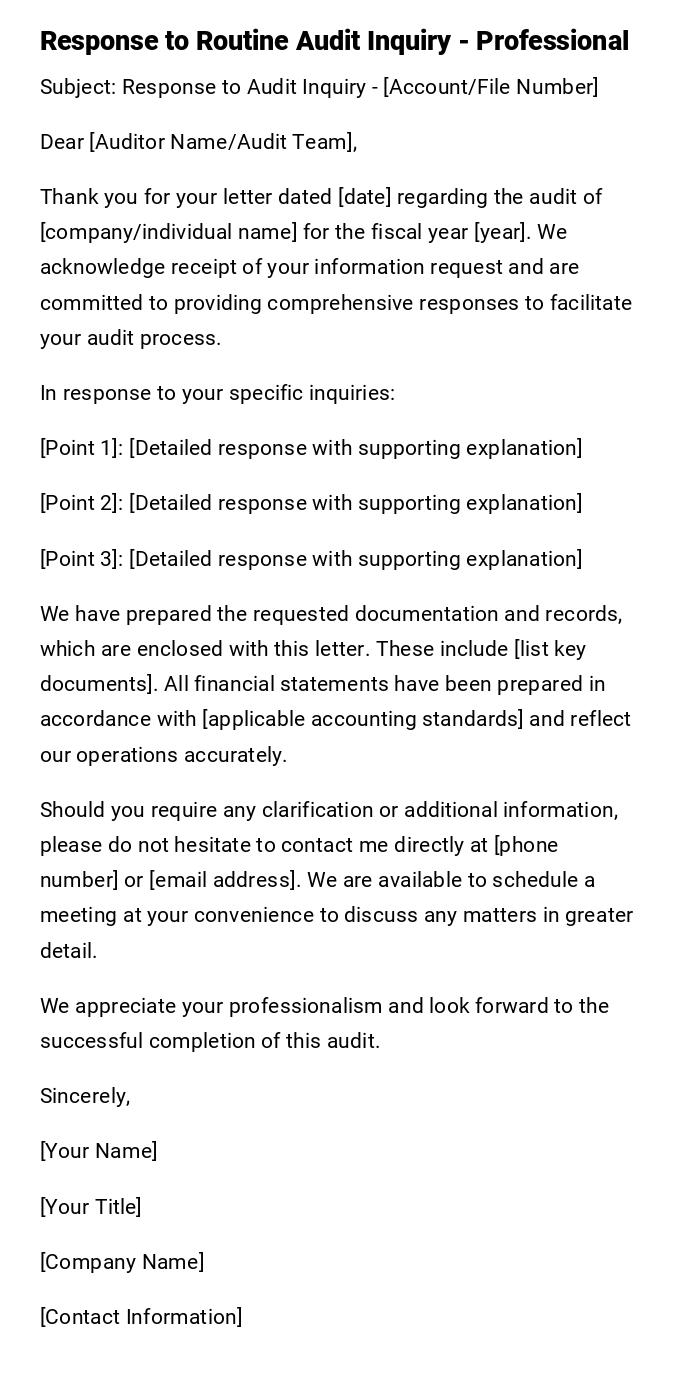
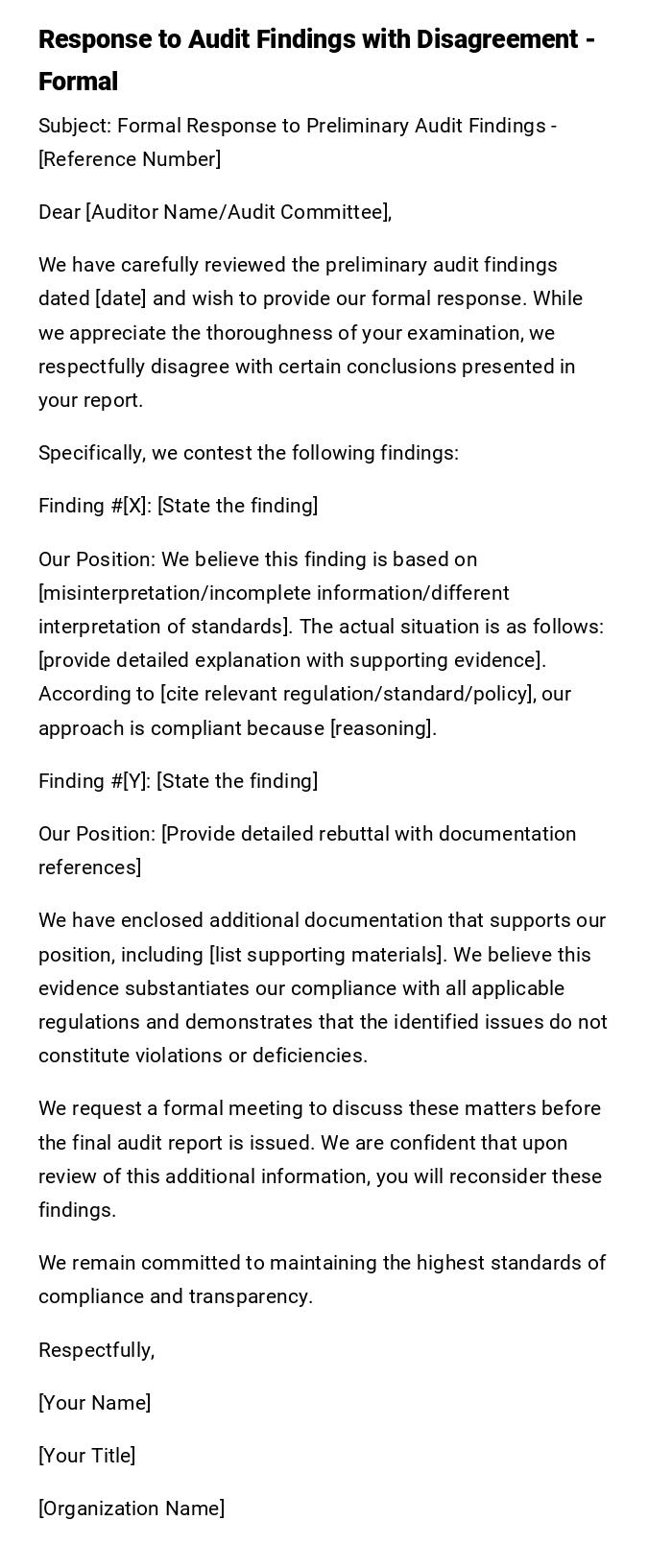
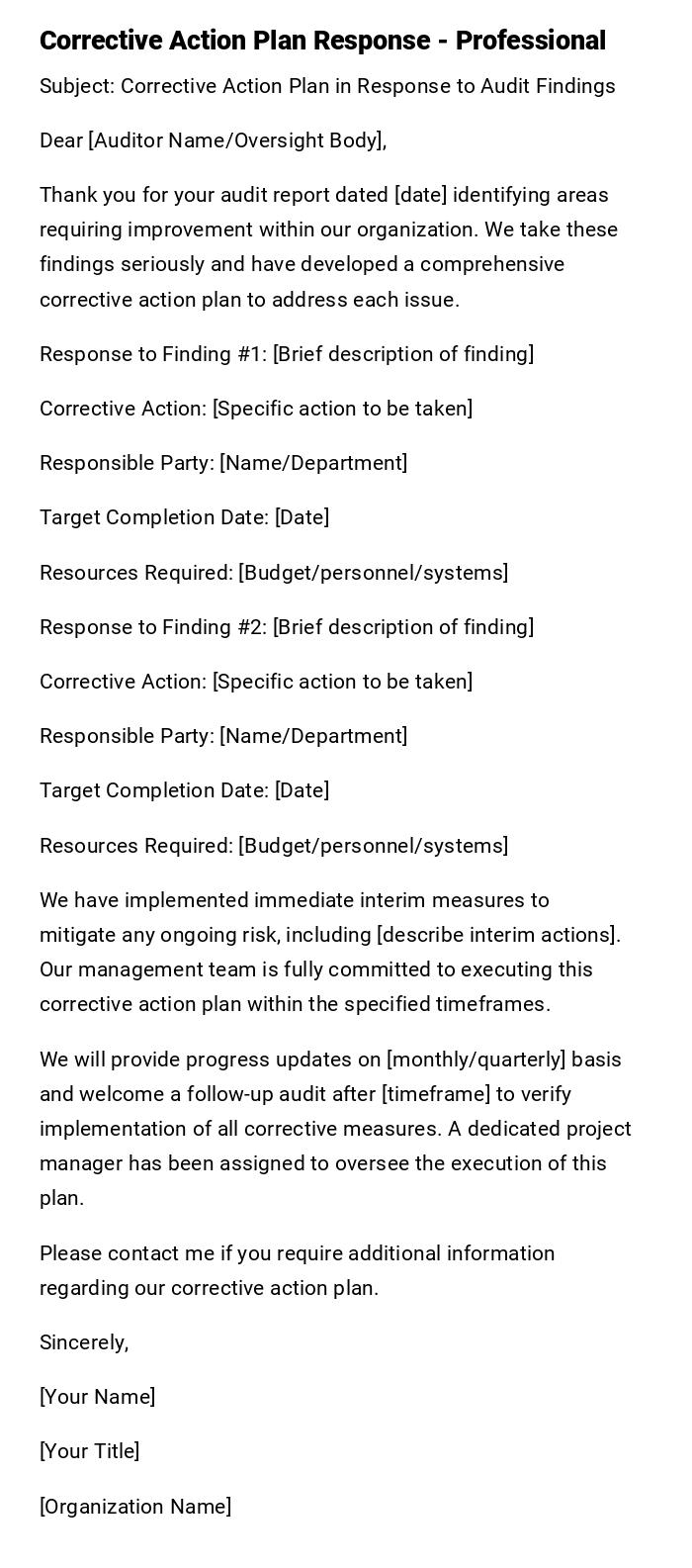
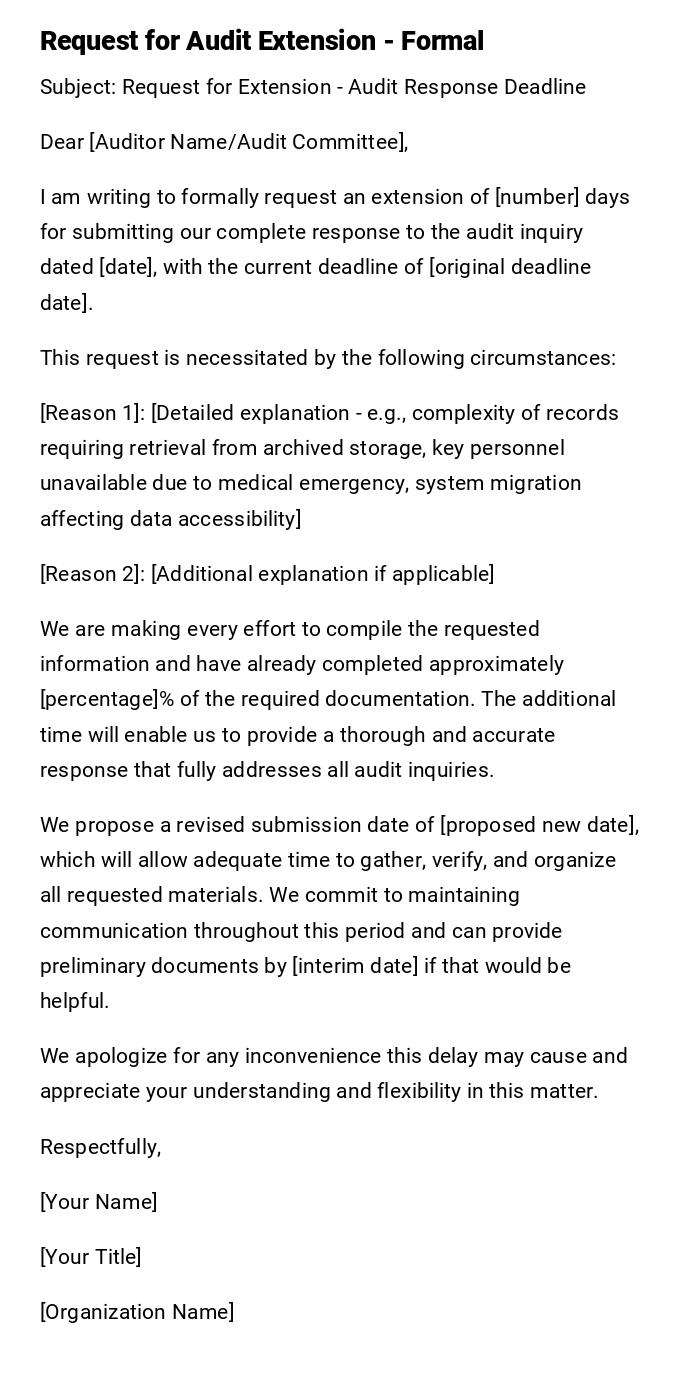
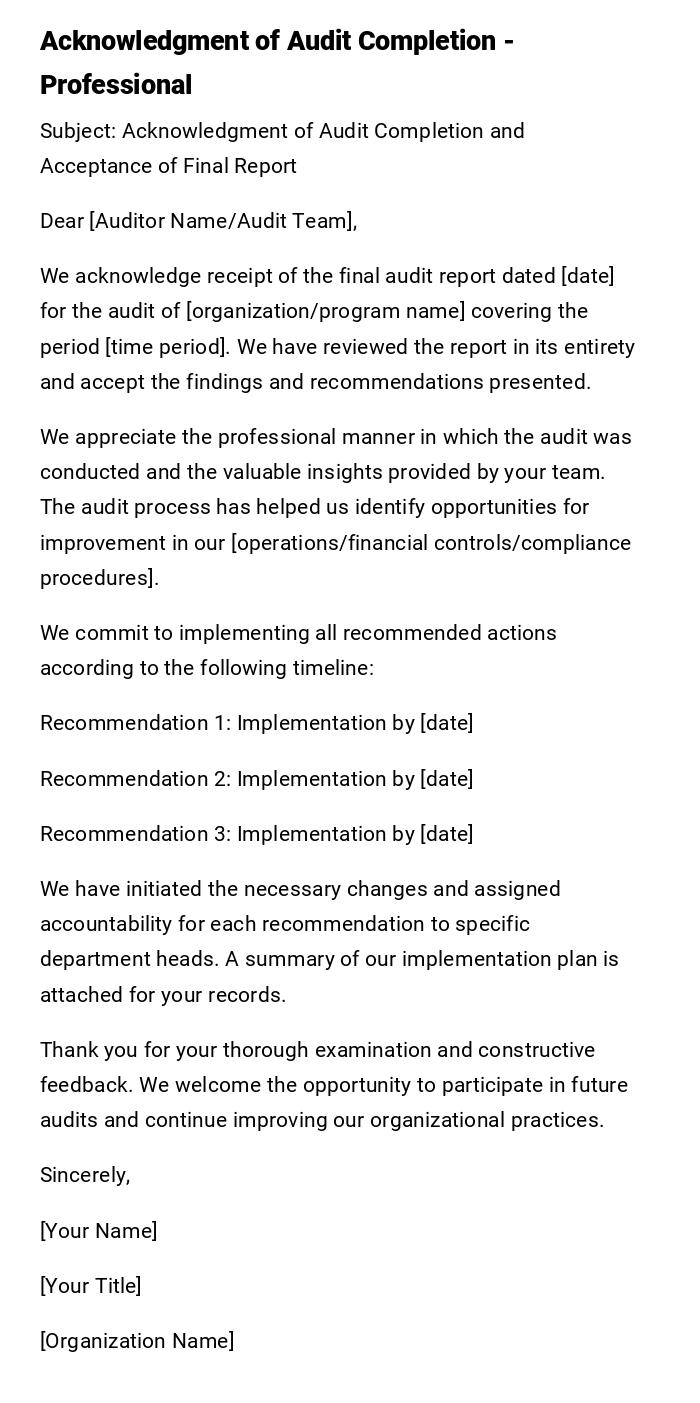
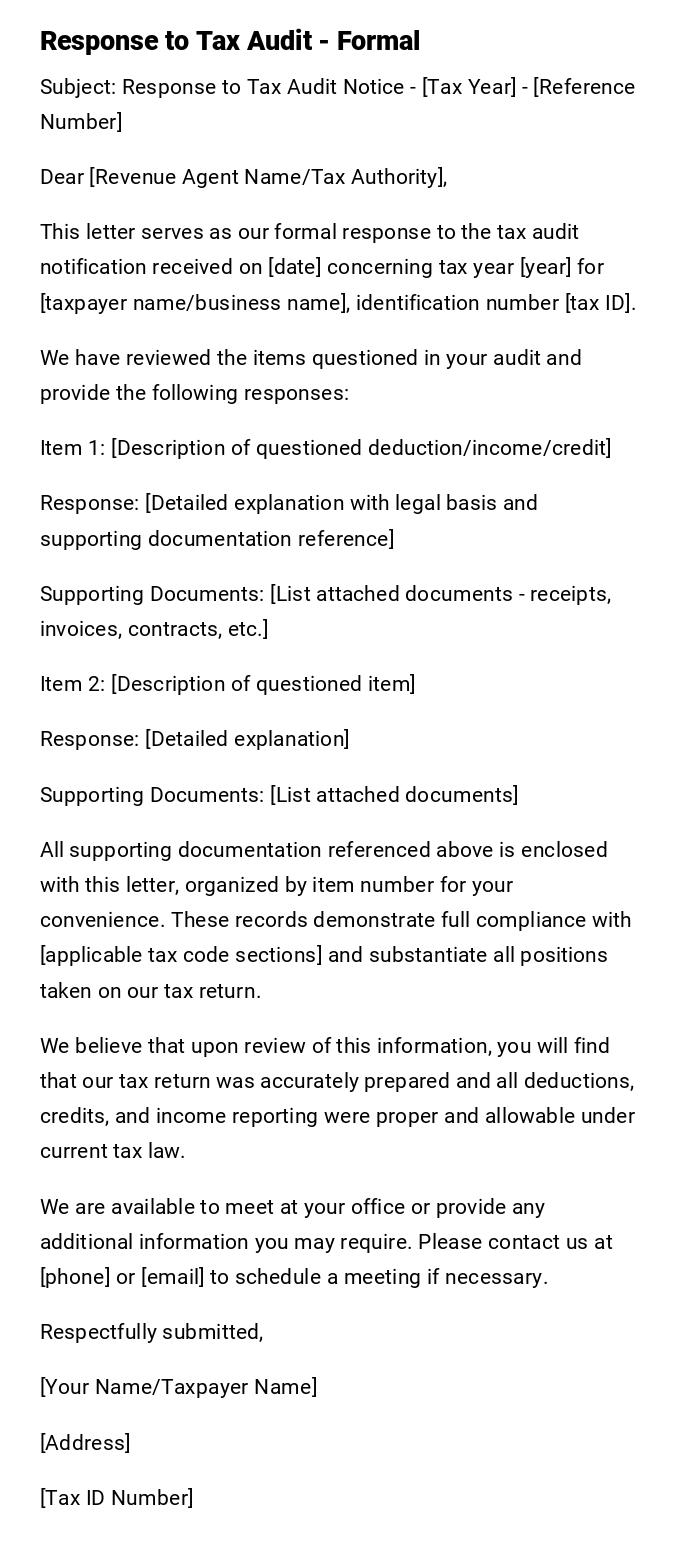
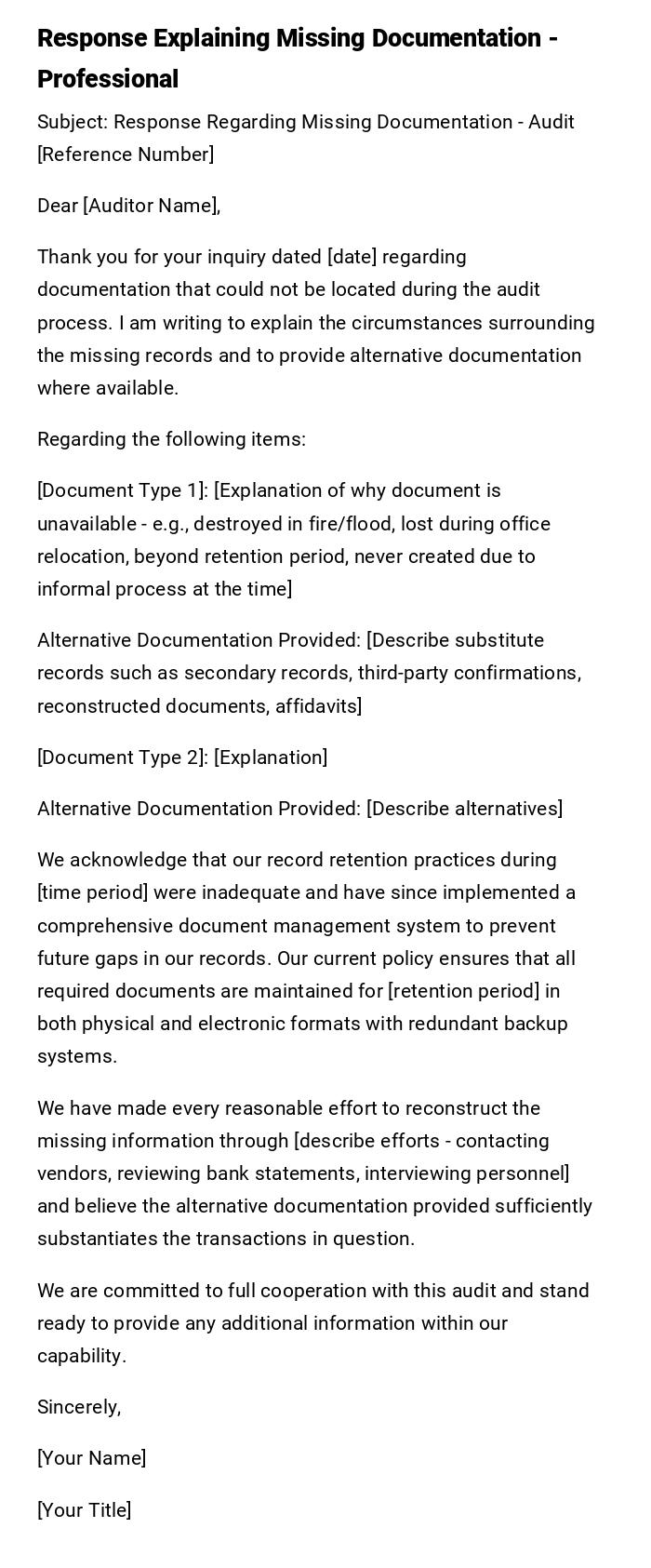
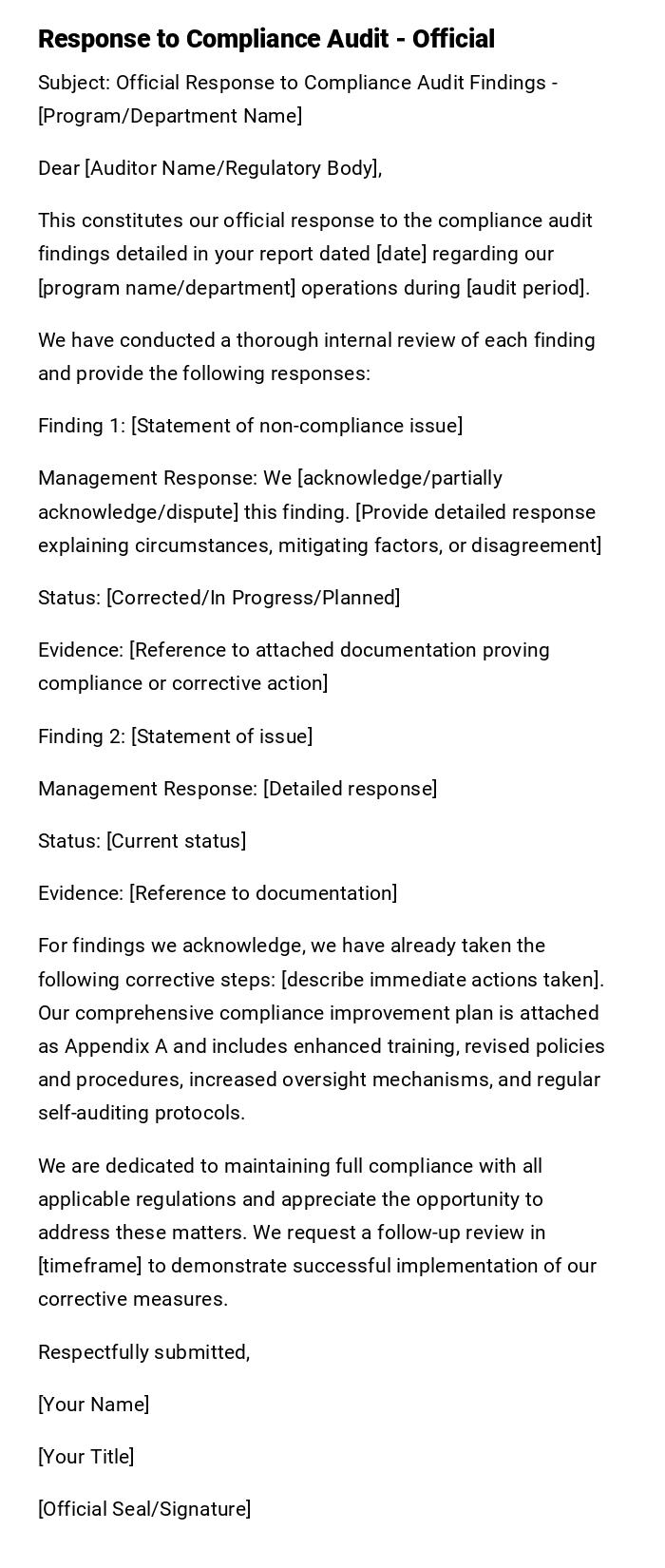

 Download Word Doc
Download Word Doc
 Download PDF
Download PDF